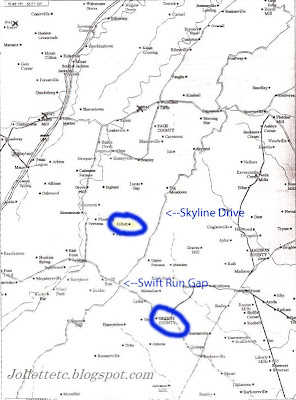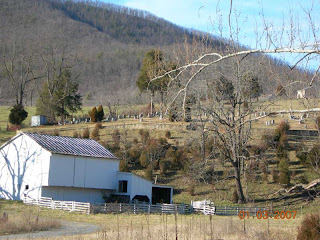This is a
continuation of the story of Good and Walton vs Jollett Chancery Cause of 1860.
Like so many young men in the early 1800s, Fielding
Jollett was destined to become a farmer.
For whatever reason, when he came “of age,” he moved away from the
family home in Greene County, crossing the mountain by way of Swift Run Gap
along what is now the famed Skyline Drive into Rockingham County.
 |
| Today the road from Greene County crossing the mountain is a series of winding curves. I wonder how long the trip took by horse and wagon. |
In 1822, Fielding married Ann Stoutemire/Stoutamoyer,
daughter of Jacob and Barbara Orebaugh Stoutemire/Stoutamoyer. Most likely they lived with her parents or
close by. In 1824, with their first
child on the way, Fielding purchased 2 acres and 24 poles of land that partially
bordered his in-laws’ property.
Two acres did not a farm make, but apparently that was
the extent of Fielding’s land holdings for some time. He likely earned his living as a laborer on
other farms, perhaps even in his father-in-law’s employ.
 |
| This is not Fielding Jollett's land, but it is the right neighborhood. photo courtesy of Lois Emswiler Rootsweb |
In 1837, Fielding and Mary Ann sold some land they had
inherited upon the death of her father, John Armentrout. How much land and how much money passed hands
is uncertain since the original deed was among the Rockingham County documents burned
during the Civil War. Fragments of the
deed were recovered and re-recorded in 1884.
Perhaps Fielding had an entrepreneurial spirit that made
him dream of becoming an important farmer and land owner. He did not sit on that money very long. That same year, he purchased 66 acres along
Naked Creek from Joseph Mauzy, county surveyor, merchant and post master.
 |
| Again, this is not Fielding's property, but this is the area where he lived and raised his family. And it's the kind of view he was privileged to enjoy every day. No wonder he bought land there. |
However, two short years later, Fielding and Mary Ann sold the same 66 acres back to Mauzy for $400. I have to wonder whether Fielding just couldn’t make a go of it there or if he had improved the farm to the extent that he could sell it at a profit. And why would Joseph Mauzy want it back?
There are no answers, but another possibility is that
Fielding had his eye on a bigger prize.
In 1849 Fielding and Mary Ann purchased 300 acres in Page County from
George and Susan Conrad. (NOTE: the area
along Naked Creek straddles Rockingham and Page counties, so it appears likely that
the Jolletts were living in the same area they had always lived.)
If trouble hadn’t begun earlier, maybe this is when Fielding’s
financial troubles began because in just a few short years, he was woefully in
debt.

It's getting quite interesting. Who knows why he had debts. Poor farmer, bad harvests, bad land. What were the economic and political conditions like in the 1840/50s, and what was the infra-structure like?
ReplyDeleteI tried looking up the history of Rockingham County, but that wasn't particularly helpful. The only reference I found to Fielding by way of his son Reverend John.. John seems to have made up for any shortcomings that Fielding may of had.
Yes, John was a much loved preacher, but he had his own little bout with the law too.
DeleteInteresting family
DeleteThat really is beautiful country!
ReplyDeleteI'm curious. Did the records say how much Fielding paid for the 66 acres along Naked Creek? I suppose it didn't or you would have included that bit of information too.
Perhaps he had great success with the 66 acres and thought he could become even more prosperous with the 300 acres. He may have gotten in over his head.
I don't know what he paid for the 66 acres. The deed in which he sells the land back mentions that it was the same land he had purchased in 1837. I don't know why I don't have a copy of the first deed. It might have been among the documents that were burned during the Civil War. Or I might have missed it when I was searching deeds many years ago. Maybe I need to create a note in OneNote to remind myself to look for it again!
DeleteHA! You're funny Wendy. If you do, you can write your own post about the awesomeness of OneNote!
DeleteI think this story could be the basis for a good novel. Think of the possibilities... :)
ReplyDeleteI'll leave the fiction-writing to you!
DeleteAfter some searching I found the Naked Creek area on the google maps. The view is indeed magnificent! I also tried out if the name could be the Dutch surname Stoutemeijer, but that didn't provide many hits.
ReplyDeleteI always assumed Stoutemire/Stoutamoyer was German since the area was settled primarily by Germans. But Dutch could certainly be a match too that I had not considered.
Delete